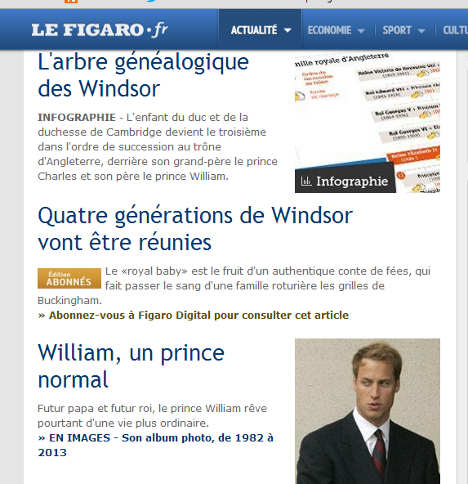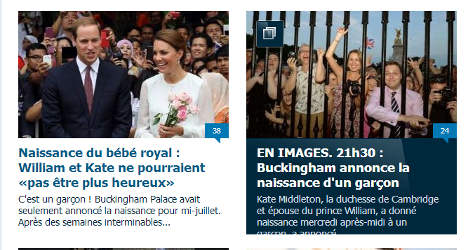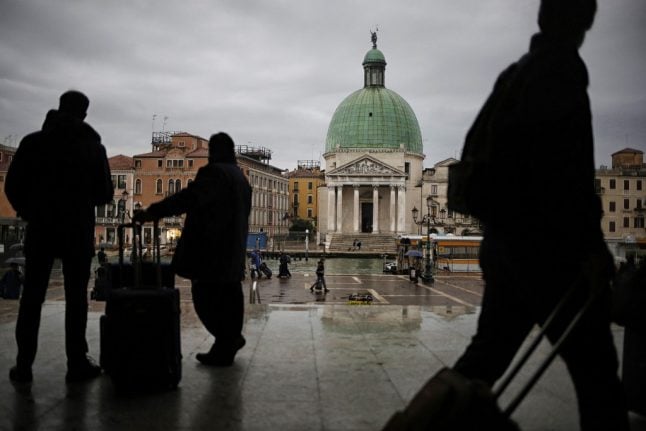The arrival of the new royal baby on Monday sparked near hysteria among the UK media and their French counterparts were not far behind.
Granted it was not the busiest of news days and it is summer but the French media pulled out all the stops in their coverage of the royal birth.
As soon as it was announced the Duchess of Cambridge had gone into labour the story was the top item throughout Monday on most French news websites.
And several sites went further, and launched up-to-date live coverage of the event throughout the day and into the night on Monday. And it was not just the more popular press like Le Parisien, whose most read articles were on the royal birth.
Centre-right daily Le Figaro, one of France’s traditional broadsheet newspapers also launched a live blog “En direct: It’s a boy” which was still running on Tuesday morning.
For the French who might have missed out on all the drama Europe1 radio website had their “Minute-par-minute – Revivez la journée” (Minute by minute – relive the day).
It wasn’t just the birth of a baby the French press were concerned about. Just as for the Queen’s Jubilee and the Royal Wedding the French continued to be intrigued by the traditions and customs of Britain’s royal family.
Numerous feature articles were donated to the traditions and customs of the British Royal family and what the birth of a future king meant for the crown.
“Everything you need to know about this birth” – read the headline in Le Parisien and Le Figaro dedicated articles to “L’arbre genealogique des Windsor” (the Windsor family tree) and “William un prince normal” in a nod to François Hollande’s much repeated pre-election promise to be a “un president normal”.
In all Le Figaro had no fewer than seven articles dedicated to the royals and the birth of the future king, including one on the baby’s star sign, on its homepage on Tuesday.

The coverage in the centre-left Le Monde and the left-wing Liberation was slightly more reserved, where attention was concentrated on the pope’s visit to Brazil and the rise in hate speech directed towards France’s traveller communities. Although Liberation did include a piece on seven reasons why the new baby is no ordinary newborn.
Hollande congratulates happy couple
Even on Tuesday morning France’s politicians, appearing in TV and radio interviews, were asked to give their reaction to the birth of the baby.
Asked what she would say to new mum Kate Middleton, Paris mayoral candidate Anne Hidalgo told BFMTV: “She needs to enjoy the moment”.
Eventually baby mania took hold of the country’s President François Hollande, although his congratulatory message to the happy couple, did come in long after the Obamas and after most Commonwealth leaders had already expressed their joy.
“The happy news of the birth of the Prince is welcomed by the French people. Valerie Trierweiler and I would like to express our congratulations and warmest wishes of joy and happiness for your newly expanded family,” the French president wrote in a letter to William and Kate.
Hollande did not stop there.
In a second letter he also sent his “warmest congratulations” to Queen Elizabeth for the birth of her great grandson.
“In these moments, France fully supports the happiness of the royal family and the joy of the British people,” he said.
“The prince will one day be called upon to rule and to follow in the footsteps of his ancestors, who ever since the Entente Cordiale, have contributed to developing excellent relations between the our two countries.”
Do the French miss their royal family?
Should we be surprised by the extent of the coverage in France for a Royal birth?
One French commentator on BFMTV suggested the obsession with Kate and William and their new prince was because the French were missing having their own royal family, who were rather unceremoniously ditched over 220 years ago.
Stephane Bern, an expert on all things royal, told French radio RTL that royal families are like “key stones” that act like “cement” in keeping a country together.
He believes the French are fascinated by royalty because the country lacks this “cement” and says the role of the French president needs to be better defined.
“We ask our president to be both king and the prime minister. It’s very complicated,” he said. Citing a famous a quote from former President Charles de Gaulle, Bern said: “The French have a taste for princes, but they will always look abroad.”
Perhaps the French would like to have their own “Guillaume et Katherine” whose every move they could follow.
Instead the nearest they have had to any kind of “baby fever” recently was the birth of Giulia to former President Nicolas Sarkozy and his singer and model wife Carla Bruni.
Although apart from Carla claiming recently that her husband does not change nappies, the pair have tried to keep little Giulia well and truly out of the public eye.
That is unlikely to be so easy for the newest member of the Windsor family, whose every dribble and every step will be closely followed by the media. Even in France it seems.





 Please whitelist us to continue reading.
Please whitelist us to continue reading.
Member comments